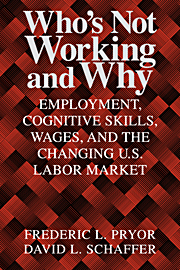Book contents
- Frontmatter
- Contents
- List of tables and charts
- Acknowledgments
- Introduction
- Employment, Cognitive Skills, and Job Displacement
- Wage Levels and Distribution
- 5 Wage Levels
- 6 The Distribution of Hourly Wages
- Alternative Approaches
- Implications and Interpretations
- Appendix Notes
- Bibliography
- Name Index
- Subject Index
5 - Wage Levels
Published online by Cambridge University Press: 25 March 2010
- Frontmatter
- Contents
- List of tables and charts
- Acknowledgments
- Introduction
- Employment, Cognitive Skills, and Job Displacement
- Wage Levels and Distribution
- 5 Wage Levels
- 6 The Distribution of Hourly Wages
- Alternative Approaches
- Implications and Interpretations
- Appendix Notes
- Bibliography
- Name Index
- Subject Index
Summary
In previous chapters of this book, we focus on employment and joblessness – the quantity side of the labor market. Along the way, we develop and find support for several controversial hypotheses about changes in the U.S. labor market over the last quarter-century. So far, our themes focus on the rising joblessness of prime-age males, the displacement mechanisms, and the growing importance of cognitive skills as a determinant of employment. In this chapter and the next, we turn our attention to the price side of the labor market – average wages and their distribution across individuals. In doing so, we look for corroborating evidence to support our previous hypotheses. We also hope to gain some new insights into the causal mechanisms underlying these changes in the labor market.
At the aggregate level, three well-documented wage trends have been occurring in the U.S. over the quarter-century between 1970 and 1995. First of all, real wages of most major groups in the labor force stagnated or fell. In fact, for prime-age men, we will show that only those with a university degree and employment in a tier 4 occupation managed to increase their wages. Secondly, the rate of return to a college degree increased. However, we will show that this “fact” is not as clear once we introduce a measure of cognitive skills into the analysis. Finally, wage inequality increased both between and within most groups. In this chapter we present evidence on the first two issues; in Chapter 6 we examine changes in wage inequality.
In the first section we outline the basic trends in wage levels.
- Type
- Chapter
- Information
- Who's Not Working and WhyEmployment, Cognitive Skills, Wages, and the Changing U.S. Labor Market, pp. 102 - 136Publisher: Cambridge University PressPrint publication year: 1999



